Darker Than Black
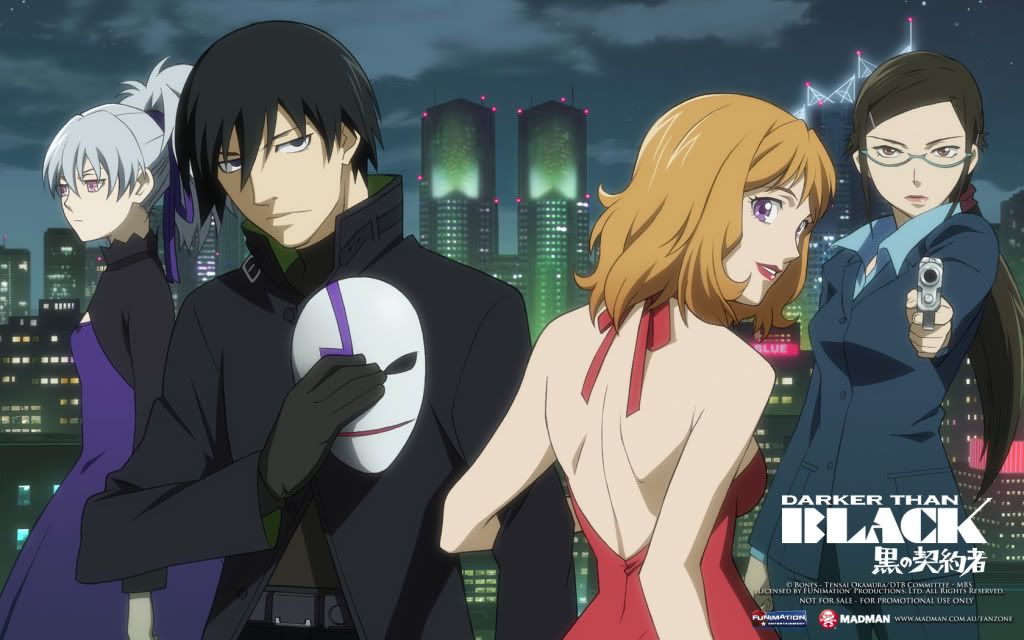
Title: Darker Than Black
Rating: 3.5/5 (Kuro no Keiyakusha – 3.5/5 / Ryūsei no Gemini – 4/5)
Genre: Action, Sci-Fi, Thriller
Starring: Hidenobu Kiuchi, Christopher Sabat, Jason Liebrecht
Director: Tensai Okamura
Language: Japanese
Duration: (25mins; Season 1: 25 Episodes; Season 2: 12 Episodes; OVA: 5 Episodes)
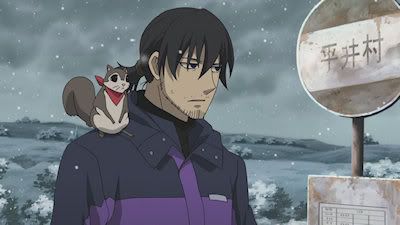 Looking over this in passing it looked a little like an anime version of the hit US TV show “Heroes,” probably not helped by the fact that it emerged just a year after its first season. The thing is, even though both dealt with the mysterious appearance of people with extraordinary abilities; flight, possession, control over the elements and so on; following a large number of characters coming to terms with their abilities and the ensuing reactions from the public, often kept in the dark as much as possible – though in this case little is known about them anyway – this is about as far from such a show as is possible. Rather than dealing with an overarching continuous story, driven by the characters, this makes gratuitous use of two-episode arcs to steadily explore this world that's been presented to us; this constant fascination with the fabricated world and how everything ties together the real hinge this tale relies upon.
Looking over this in passing it looked a little like an anime version of the hit US TV show “Heroes,” probably not helped by the fact that it emerged just a year after its first season. The thing is, even though both dealt with the mysterious appearance of people with extraordinary abilities; flight, possession, control over the elements and so on; following a large number of characters coming to terms with their abilities and the ensuing reactions from the public, often kept in the dark as much as possible – though in this case little is known about them anyway – this is about as far from such a show as is possible. Rather than dealing with an overarching continuous story, driven by the characters, this makes gratuitous use of two-episode arcs to steadily explore this world that's been presented to us; this constant fascination with the fabricated world and how everything ties together the real hinge this tale relies upon.And explaining how all this fits together is no mean feat, nothing is ever as simple as it first seems, but surrounding it all is Hells Gate. This is where everything truly began and the origins of the problems; an area that emerged in Tokyo that quickly had to be cordoned off for unknown reasons, and the subject of study for every nation on the planet. The world now lies divided, no
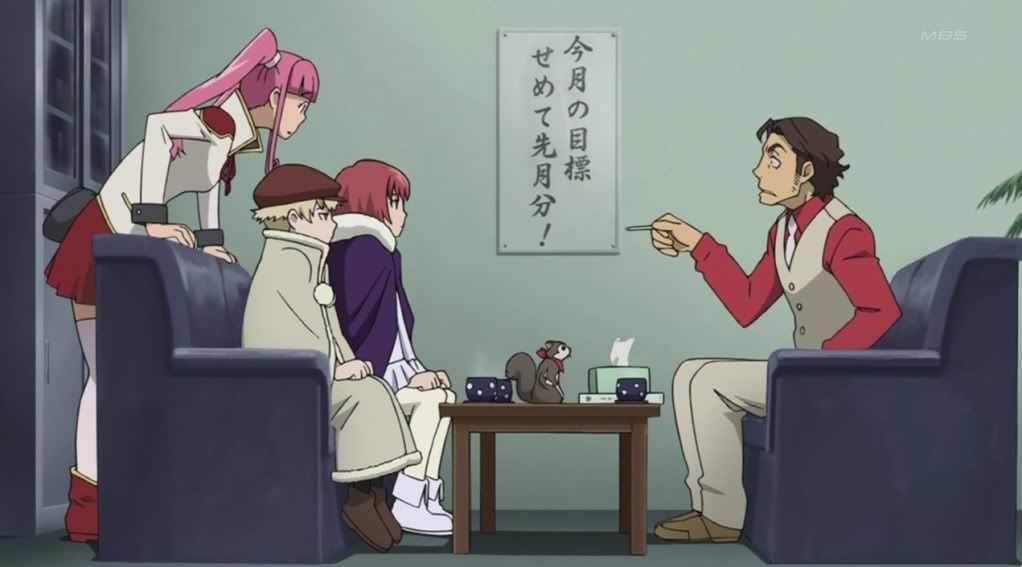 nation quite trusting another in the sharing of any scrap of information they have regarding the mysterious Hell's Gate and the events that surround it. Only the mysterious 'Syndicate,' a global underground faction whose motives remain unknown even by those who work for them, and the members for 'Evening Primrose,' campaigning for fair treatment for contractors, hold activities within multiple nations, for with the Gate's arrival came more than just a mysterious location. The stars in the night sky are all fake, a shroud of bright lights each one corresponding to a “contractor:” an individual possessing an extraordinary ability, so named for the contract they make in using their ability; a compulsion to do something to appease their own mind.
nation quite trusting another in the sharing of any scrap of information they have regarding the mysterious Hell's Gate and the events that surround it. Only the mysterious 'Syndicate,' a global underground faction whose motives remain unknown even by those who work for them, and the members for 'Evening Primrose,' campaigning for fair treatment for contractors, hold activities within multiple nations, for with the Gate's arrival came more than just a mysterious location. The stars in the night sky are all fake, a shroud of bright lights each one corresponding to a “contractor:” an individual possessing an extraordinary ability, so named for the contract they make in using their ability; a compulsion to do something to appease their own mind. This in itself lends a rather interesting dynamic to the contractors, supposedly without feelings of remorse or guilt, they are intended to make rational and ruthless killing machines, and yet somehow affections can develop over time; guilt can be made as part of their punishment, and due to their sociopathic nature they are only interested in self-preservation with little idea of loyalty, making them something of a loose cannon should a situation ever not favour them. The price they pay for their abilities can often be as high as varying degrees of self harm – persuasive enough to make anyone think twice about using their gift unless absolutely necessary – or as minor as simply eating or drinking something. But as we explore deeper into just what makes a contractor, it isn't long before we realise that they aren't the only 'new
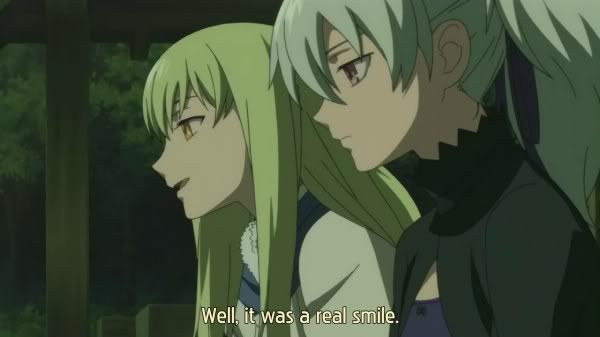 evolution' to have emerged; young children known as 'dolls,' completely without all emotion and capable of tapping into a specific element and using that same element all over the world to permit their spirit to arise and observe their surroundings; spirits that can only be seen by contractors. And then somewhere in this jigsaw puzzle of confusion are the moratorium; creatures that somehow fit between the two (though this is isolated entirely to one arc).
evolution' to have emerged; young children known as 'dolls,' completely without all emotion and capable of tapping into a specific element and using that same element all over the world to permit their spirit to arise and observe their surroundings; spirits that can only be seen by contractors. And then somewhere in this jigsaw puzzle of confusion are the moratorium; creatures that somehow fit between the two (though this is isolated entirely to one arc).Despite this complexity that takes its time to become accustomed to, it rarely becomes overwhelming (except when we come to the finale for both seasons, when once more we are bombarded with vague information, skipping over critical points far quicker than we can take in, and making the whole process frustratingly and unnecessarily confusing), and it notably picks up the pace once there are fewer elements to try and adequately explain, but this most fascinating point to the entire series – this new world rife for exploration – never finds its way to the forefront, instead often merely using it as a simple backdrop to weave these multiple tales that 'just happen' to often include the same characters. There is rarely any details given about the mystery of the gate, making it little more than some poor excuse for an explanation for the changes that have occurred in the world, and some arcs barely feel as though they have anything to do with this new world at all, maybe vaguely making a point about some minor and almost trivial aspect rather than dive to the core of the story. There is the occasional mention of some catastrophe that occurred at “Heavens Gate,” but even this is never elaborated on. It seems they spent all this time creating an original idea to utilise and then never actually bothered to explore it, leaving it quickly
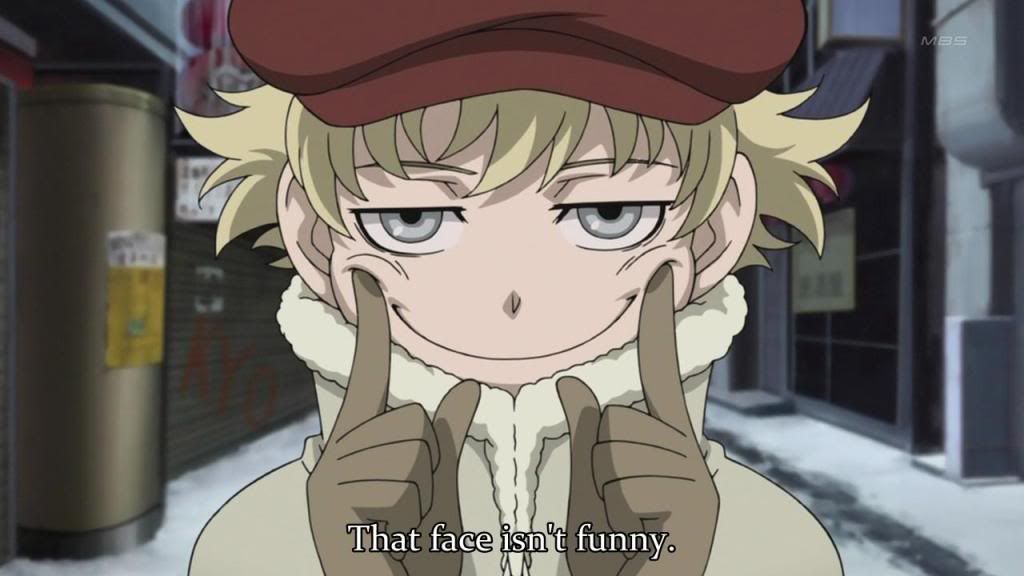 feeling rather dissatisfying as you delve deeper and realise nothing new has come to light, and fails to do so until the final few episodes.
feeling rather dissatisfying as you delve deeper and realise nothing new has come to light, and fails to do so until the final few episodes.With the multiple plot arcs, it naturally occurs that some will be stronger than others,but it felt as though throughout the series there were multiple different writers responsible for their little bit, and they weren't all on the same page; the tone may suddenly shift to a fairly comedic plot, or a more dramatic and less action orientated arc, and this inconsistency never fails to make itself feel painfully apparent. In fact, for a show called “Darker than Black” it often has a decisively light tone, jovial even at times – particularly regarding the detective character – if not quite stretching as far to ever make it play out like a comedy. The one thing that does take precedence, however, is that there is always a long build up to the action; it can't simply cut right to the chase, as much of the interest arises from the multiple factions and how they collide, and even the members of these factions and their relationship to it. If you're looking for a rollercoaster ride of adrenaline filled sequences then you won't be getting your kicks here. It's far too heavily invested in trying to make this impossible situation seem possible; as if to say 'what if?' and then extrapolate plausible results. The contractors are far from invincible, some come in barely more powerful than anyone else, and using their powers intelligently often makes that critical difference in their overall success, and this often makes the combat when it does arrive all the more satisfying as a result.
The animation is for the most part done well, if not demonstrating anything that feels particularly special; the backgrounds rarely feel as though they could benefit from greater detail and the character animations have been well drawn out and feel incredibly distinctive, the quality consistent throughout (and not significantly declining towards the shows end as with some cases). What was done particularly well, however, was the work that went into the abilities and the strange phenomena that occur; the use of light and dark to set the atmosphere, the
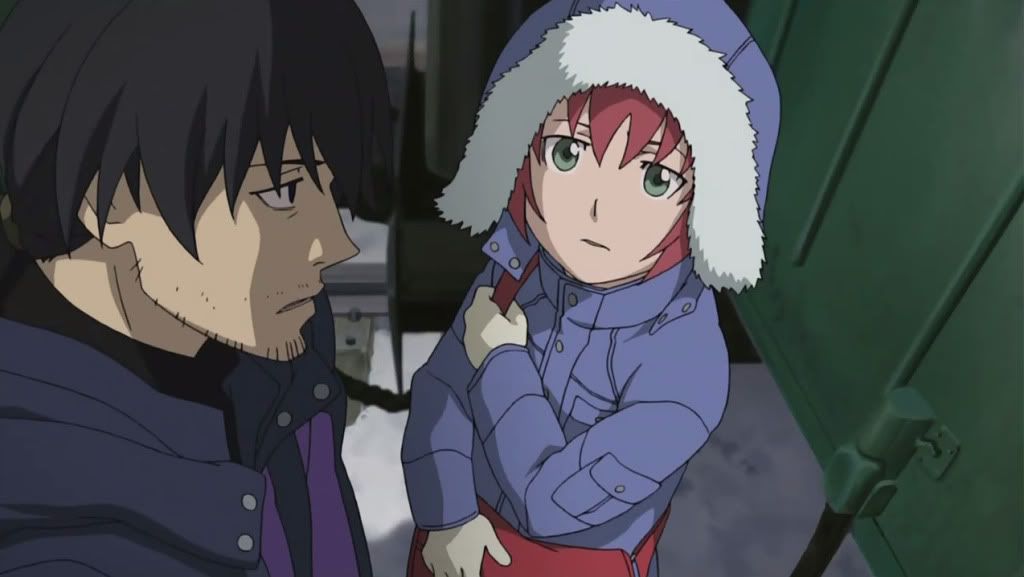 colour and the effects lending a strange mysterious allure and lending a relative sense of realism to it all. It never feels out of context with the generally serious nature of the show, or too focussed on style at the detriment of breaking the tone that's been created, which in a series where it takes such an important role is very much to its credit.
colour and the effects lending a strange mysterious allure and lending a relative sense of realism to it all. It never feels out of context with the generally serious nature of the show, or too focussed on style at the detriment of breaking the tone that's been created, which in a series where it takes such an important role is very much to its credit.Many of the vast characters arrive but then leave all too quickly, and there are only a small minority of characters that are actually given the time to develop over the course of the show, with the vast multitude given very minor roles and often don't survive for all that long, and not all of these are particularly interesting to begin with. A large issue with this stems from the simple fact that so many of the characters – even one of the only 'human' characters – are specifically designed to be emotionally stunted. We rarely know what they're thinking let alone display any sense of emotion over the events that occur and this makes it incredibly difficult to truly engage or identify with any particular character, except in those minority of cases where they actually do manage to display some sense of emotion heightened above the normal and often only works simply by being unexpected, and ultimately can make things boring to watch when the story arc isn't up to scratch.
This would have worked far better as a singular long flowing story, or at the least increase the length of time devoted to each one – and indeed does, when you finally reach the second season which follows a singular arc and creates more character empathy in a fraction of the time, and that final five-episode arc of the first season where things finally become explained, both being amongst the series' highlights for it's depth of story and the pacing, even if it finishes in something of a cliché manner – with characters arriving and leaving; another 'Monster' or 'Ergo Proxy' to go along with the rather serious tone the series takes, slowly unfurling more information as it proceeds, but instead it seems as though it wasn't quite sure what it wanted
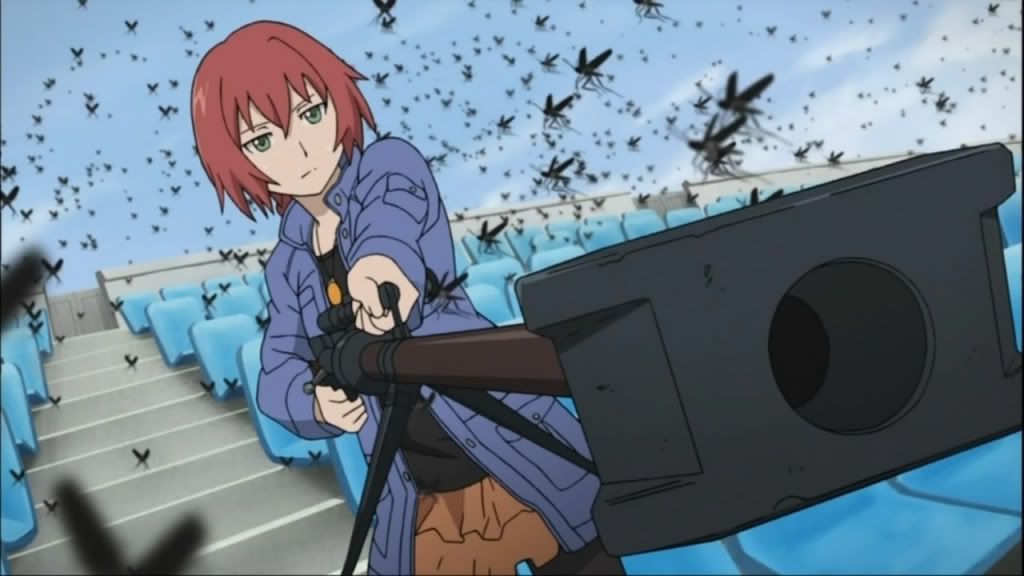 to be. On the one hand, if one plot arc didn't work then it wouldn't drag on for too long, but it seems too complex and too detailed for that to really work; it's too intelligent to simply be a show to shut your mind off to for a while and enjoy, there's too much to think about. There are so many characters to be explored, their nuances and the psychological effect of being a contractor or a doll, not to mention the relationships they have to their organisation and with members of opposing factions. There was the promise of something grandiose and epic here; an entire world just begging for you to immerse yourself in. Why they squandered it all on mediocre stories about uninteresting characters that we'll never see again is simply beyond me.
to be. On the one hand, if one plot arc didn't work then it wouldn't drag on for too long, but it seems too complex and too detailed for that to really work; it's too intelligent to simply be a show to shut your mind off to for a while and enjoy, there's too much to think about. There are so many characters to be explored, their nuances and the psychological effect of being a contractor or a doll, not to mention the relationships they have to their organisation and with members of opposing factions. There was the promise of something grandiose and epic here; an entire world just begging for you to immerse yourself in. Why they squandered it all on mediocre stories about uninteresting characters that we'll never see again is simply beyond me.
Comments
Post a Comment